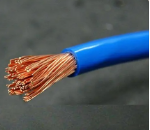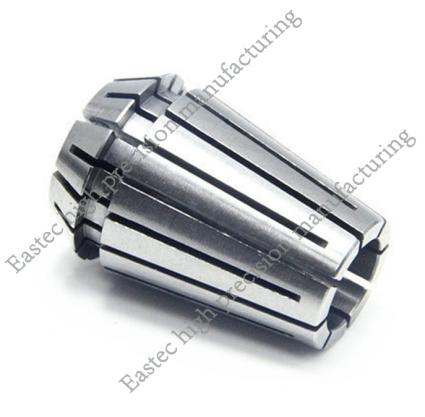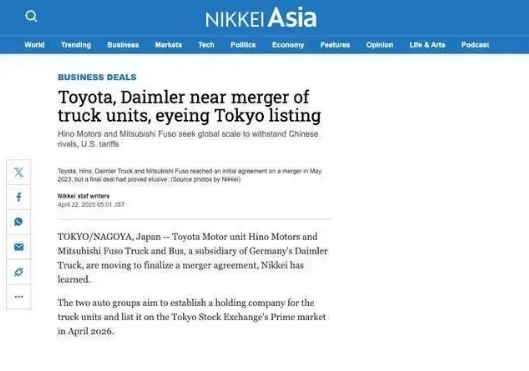Against the backdrop of the global commercial vehicle industry's accelerated transformation towards electrification and intelligence, a strategic integration that affects the market landscape in Asia and even the world is in progress. In April 2025, Hino Motors, a subsidiary of Toyota Motor of Japan, and Mitsubishi Fuso Truck and Bus Corporation, controlled by Daimler Truck Holding of Germany, restarted merger negotiations. They plan to sign a final agreement as early as May to establish a holding company to integrate their businesses and are expected to list on the Tokyo Stock Exchange's Prime Market in April 2026. This cooperation, which started in May 2023, was once suspended due to Hino's engine certification fraud scandal. Now, with the resolution of compliance issues and the progress of antitrust reviews, it is accelerating towards completion.
The core driving force behind this merger stems from the dual pressures faced by the commercial vehicle industry. On the one hand, under the global trend of carbon neutrality, the tightening of emission regulations in various countries forces enterprises to accelerate the research and development of electrification and hydrogen - energy technologies. On the other hand, the rise of Chinese commercial vehicle brands and the impact of US tariff policies force traditional giants to enhance economies of scale through integration.
The merger of Hino and Mitsubishi Fuso is a microcosm of this trend. The combined sales volume of the two companies in the 2024 fiscal year was approximately 230,000 vehicles. After the merger, they will become one of the largest truck manufacturers in Asia, accounting for about 14% of the global medium - and heavy - duty truck market. If Daimler Truck's global annual sales volume of 407,261 vehicles is included, the overall market share may exceed 20%, creating a significant advantage over competitors in emerging markets.
Technical synergy and strategic layout are the underlying logic of this merger. Hino has deep accumulation in the field of hydrogen fuel cells, and the hydrogen - energy technology jointly developed with Toyota has been applied in some models. Mitsubishi Fuso, relying on Daimler's technical reserves and Southeast Asian market channels, has made progress in the commercialization of electric trucks. After the merger, the new company will integrate Hino's fuel - cell patents with Mitsubishi Fuso's regional supply chain to accelerate the implementation of hydrogen - powered heavy trucks in fixed - route scenarios, such as port logistics and mining area transportation. At the same time, the two sides plan to share the autonomous driving R & D platform to reduce the development cost of L4 - level autonomous driving systems, which is particularly important in an industry where the R & D investment per vehicle exceeds 2 trillion yen.
Notably, the ingenious design of the capital structure has cleared the obstacles for the merger. Toyota's stake in Hino will be diluted from 50.1% to less than 20% in the new holding company, while Daimler maintains the balance by retaining 89.3% of Mitsubishi Fuso's equity.
This arrangement not only avoids the antitrust doubts of the Japanese Fair Trade Commission regarding Toyota's simultaneous shareholding in Isuzu Motors but also ensures the strategic synergy of the two major parent companies. Toyota can focus on the construction of the hydrogen - energy ecosystem, while Daimler can strengthen its presence in the Asian market. In addition, the new company adopts a "dual - brand, single - operating entity" model. While retaining the independent sales channels of Hino and Mitsubishi Fuso, it integrates the R & D and production systems, which is expected to reduce operating costs by 30 billion yen annually. This merger also reflects the survival anxiety of traditional automakers. Since the initial agreement was signed in 2023, Hino has paid a $1.2 - billion settlement due to engine data fraud, and Mitsubishi Fuso has encountered soaring supply - chain costs, exposing the vulnerability of a single enterprise in the face of drastic industry changes. The plan of the merged entity to raise funds through listing on the Tokyo Stock Exchange is trying to solve the funding dilemma of electrification transformation. It is estimated that the transformation of the hydrogen - powered truck production line alone will require an investment of more than 500 billion yen. This "group - listing" strategy may create a new paradigm for the financing model of traditional commercial vehicle enterprises.






 Customer service 1
Customer service 1  Customer service 2
Customer service 2